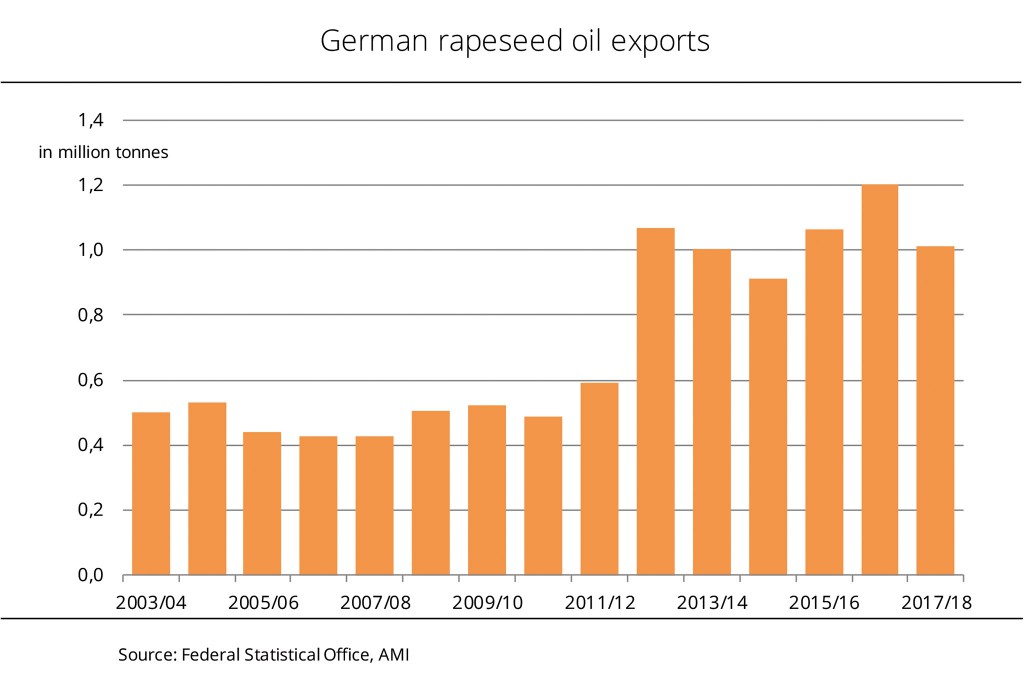Berlin, 18 September 2018. German exports of rapeseed oil in the 2017/18 marketing year fell short of the previous year’s record level. Above all, some EU member states purchased considerably less rapeseed oil.
 According to figures published by the German Federal Statistical Office, German exports of rapeseed oil declined for the first time in three years in 2017/18. At around 1 million tonnes, sales to foreign countries were down almost 16 per cent from 2016/17. Agrarmarkt Informations-Gesellschaft mbH has suggested that the decline is probably due to the scarcity of feedstock and high level of competition from other vegetable oils. Just about 96 per cent of exports went to other EU countries, which translates to an approximately 12 per cent decrease year-on-year. The Netherlands, the hub of international trade, were the main buyer of German rapeseed oil, with imports amounting to around 570,400 tonnes. This was down 4 per cent from a year earlier. Polish imports dwindled just less than 37 per cent to 132,000 tonnes. Belgium occupied third place among the main recipients, seeing a 23 per cent drop to 69,900 tonnes. Demand from EFTA states (Iceland, Norway and Switzerland) for German rapeseed oil slumped 66 per cent from the previous year to 26,900 tonnes. By contrast, Kenya ramped up its imports 200-fold to 1,800 tonnes and is now among the top 20 recipient countries of German rapeseed oil.
According to figures published by the German Federal Statistical Office, German exports of rapeseed oil declined for the first time in three years in 2017/18. At around 1 million tonnes, sales to foreign countries were down almost 16 per cent from 2016/17. Agrarmarkt Informations-Gesellschaft mbH has suggested that the decline is probably due to the scarcity of feedstock and high level of competition from other vegetable oils. Just about 96 per cent of exports went to other EU countries, which translates to an approximately 12 per cent decrease year-on-year. The Netherlands, the hub of international trade, were the main buyer of German rapeseed oil, with imports amounting to around 570,400 tonnes. This was down 4 per cent from a year earlier. Polish imports dwindled just less than 37 per cent to 132,000 tonnes. Belgium occupied third place among the main recipients, seeing a 23 per cent drop to 69,900 tonnes. Demand from EFTA states (Iceland, Norway and Switzerland) for German rapeseed oil slumped 66 per cent from the previous year to 26,900 tonnes. By contrast, Kenya ramped up its imports 200-fold to 1,800 tonnes and is now among the top 20 recipient countries of German rapeseed oil.
The Union zur Förderung von Oel- und Proteinpflanzen (UFOP) has expressed fears that in the wake of the decline in sales, pressure on producer prices will persist despite the drop in rapeseed harvest all across the EU. The main reason is seen in surplus supply of rapeseed oil based on the slowdown in demand from the biofuels industry. UFOP has called for urgent action to develop additional sales options, for example by raising the GHG reduction quota by no later than the beginning of 2019 or by tapping into new non-EU markets as part of export promotion programmes.
Source
Union zur Förderung von Oel- und Proteinpflanzen (UFOP), press release, 2018-09-18.
Supplier
Union zur Förderung von Oel- und Proteinpflanzen e.V. (UFOP)
Share
Renewable Carbon News – Daily Newsletter
Subscribe to our daily email newsletter – the world's leading newsletter on renewable materials and chemicals









